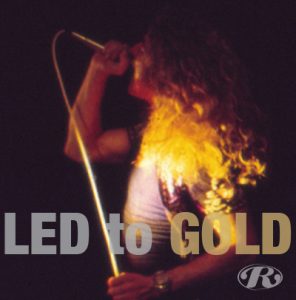10 Apr New UK Weapon Led Zeppelin Flying High

[Friday, April 10, 1970]
Ottawa journal
TORONTO – When they get around to evaluating rock music by year (in a manner of generalizing very common in the wine industry, e.g. ’67 was a great year for whites but the reds were a little bitter) 1969 is not going to be a year you’ll hear to often.
The last year, in fact, was one of rock’s least memorable periods. There was hardly a single worth mentioning (indeed hit singles seem to get worse by the month); Bob Dylan’s “Nashville Skyline” was not his finest album nor was it close; the Beatles’ Abbey Road was a magnificent effort yet many ineffectual critics still slurped of Sgt. Pepper.
They slurped, at least, until John Lennon came out and said that he thought every album since Pepper had been better than it, including “Magical Mystery Tour.”
The last year of the Sixties saw soul music sink to an all-time low, both in popularity and polarity. Aretha Franklin only made it to one record session, and the results weren’t heard until a month or so ago.
The Rolling Stones made a monumental album in “Let It Bleed,” but seemingly took it title too seriously. All the sharp incisions performed by Let It Bleed were completely overshadowed by the hatchet job at Altamont. Creedence Clearwater made it to the upper rungs with many albums, all of which sounded like the one before.
DEAR LITTLE Donovan came out against dope, hoping to pick up on the eight-year-old record market, which is just starting to be taped and has proved to be fertile soil for acts such as Three Dog Night, the Ohio Express, Tommy Roe, Shocking Blue, and the Union Gap.
Top-40 radio reached a swampy bottom. Didn’t you notice how the Golden Olden weekends sounded a hundred times better than regular programming? That’s because prior to the fawning of format radio, record producers made records with a lot of creativity and little regard for the current top 10.
When it’s all boiled down, the only really encouraging thing that happened last year was the unveiling of Led Zeppelin, England’s latest weapon in the war against American Rock. By year’s end, Led Zeppelin – a group unknowns apart from guitarist Jimmy Page – had become the most important new band since the Beatles, surpassing even Cream in popularity.
The group’s sudden success came after Cream curdled and Hendrix fell victim to well-fed delusions of grandeur. There wasn’t much of music’s usual hype, and there was even less critical acclaim for the Zepp.
Even now, it’s very much in vogue in rock critic circles to rip off Led Zeppelin as a noisy bunch of perverts from England. Even some of rock’s upper echelon of publications still seem to deny the existence of the Zeppelin. Initially, there wasn’t much serious critical evaluation of Led Zeppelin. They were just another stoned-out band from England into blues. Sure they had a guitarist from the Yardbirds but wasn’t Jeff Beck the man to watch from that trip? Scepticism, apathy, ignorance. Meanwhile, the Zepp had arrived and hit and left the charts coated with the debris of a hard-rock hurricane.
THE BAND’s concert price zoomed from a low of $250 in Januarsy of last year, to $25,000 at the start of their current, fifth tour. Both albums had sold in excess of one million copies by Christmas. And a single, Whole Lotta Love, went very close to a million.
The new tour will earn the group more than $800,000 and will take in Vancouver on March 21, Montreal on April 13 and Ottawa the following night.
Any day now, Sixteen magazine and all those other guides to the six-year-old mentalities will realize that Bobby Sherman, Dino Desi and Billy, and the Monkees are not what’s happening.
Right now, what’s happening in rock is very much in the hands of Jimmy Page, John Bonham, Robert Plant and John Paul-Jones. Without question, Led Zeppelin is the world’s most popular group, outside the Beatles, and no one knows anymore if the Beatles still are a group.
SOMETHING
A tribute from King Curtis is no insignificant gesture. He is widely regarded as the pop world’s No. 1 tenor sax man.
He has played on each of the historic, sales-spiralling recording sessions of Aretha Franklin, and it was he who arranged, and blew sax, on Aretha’s classic version of Respect.
King is appearing at the Coq D’Or for two weeks, taking a strong claim as the foremost blues bandleader on the circuit today.
On uptempo numbers, he would make a touch-typist envious as he punches on the saxophone keys with amazing speed and dexterity.
He holds a blue note for so long that one begins to wonder if he has an auxiliary air tank hidden away on his bulky frame. He plays with unquestionable enthusiasm, dynamic drive, and sensitive persuasion.
VERSATILE
He’s equally at home with ballad or beat. It might have been freezing outside, but inside there was a heat wave going on.
The act’s eight-minute version of Ode To Billy Joe may yet bring the poor boy back to life. King’s rendition of I Was Made to Love Her is even more compelling, carrying a Cassius Clay-class punch.
Memphis Soul Stew, a recent hit for the combo, came off like home made apple pie. The clincher was Soul Serenade, a tortuous yet tender ballad, which Curtis blew through on his saxello with almost naive sensitivity.
Toronto is obviously hip to the Curtis message; the club was packed with people of all ages, the over 30’s predominating.
PISTON
Curtis and the Kingpins are as tight as a hot rod piston, with comparable power. The group comprises Jimmy Smith on electric piano, Mervyn Bronson on bass, Al Thompson on drums, and Stirling McGee on guitar, all first- class sidemen.
Curtis also introduced a young female vocalist, one Ruby Michelle, who contributed more than adequate workouts on current contemporary favorites like Chain of Fools.
The music is down to earth. The group is the equal of anything, anywhere. Curtis is King for those who like good music well played.


